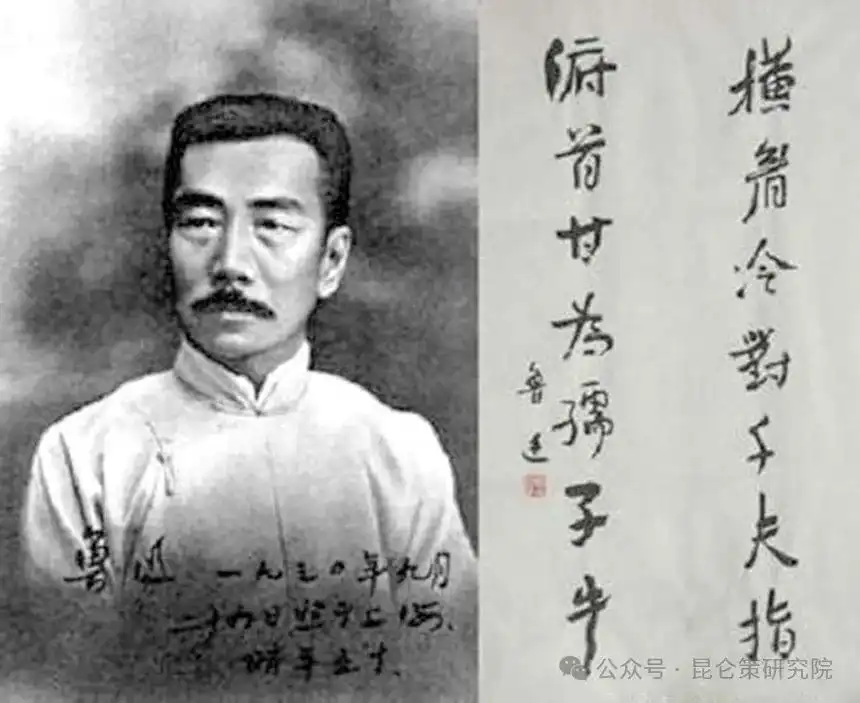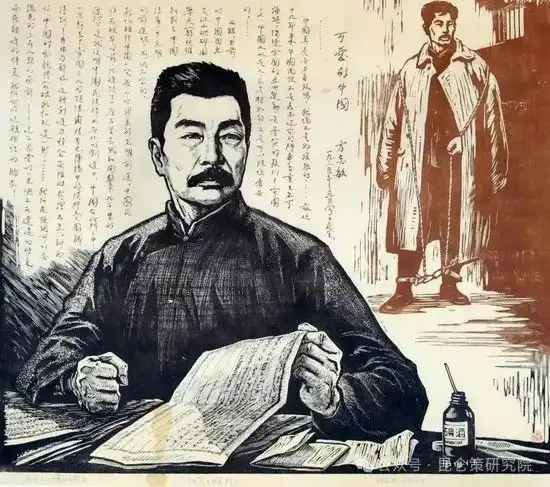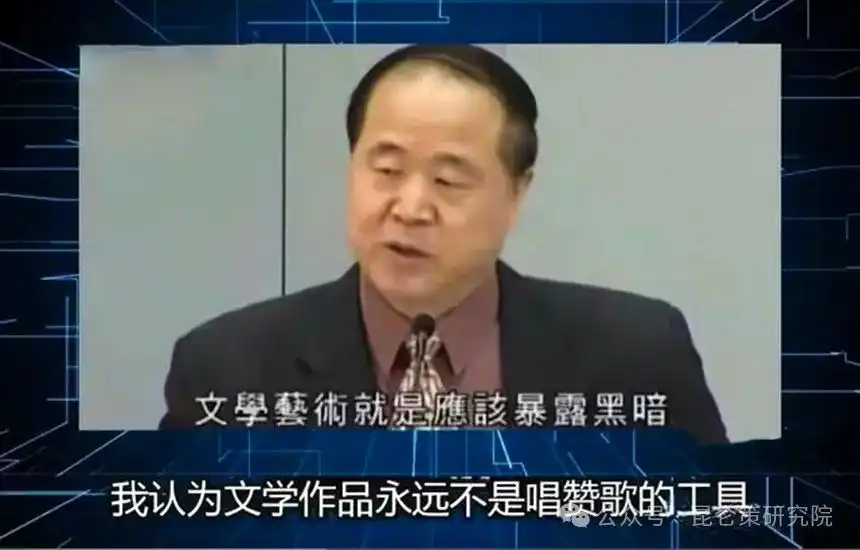An Analysis of Mo Yan's Misunderstanding of Lu Xun's Essays
Click "Kunlun Policy Research Institute" above to follow this account; click "..." in the top right corner to select the reading function, and the voice is automatically synthesized by the computer, which is inevitably wrong and is only for auxiliary reading.

Mo Yan, an award-winning writer, has advocated for literature for a period of time, saying that "literature is never a tool to sing praises. Literature and art should expose darkness. Even if there is only one reader left, I will continue to write." "Excellent literary works should transcend parties, classes, politics, and national boundaries." Mo Yan is a Nobel Prize winner, and wearing this glorious clothing makes him appear especially deceptive. Someone then says with great seriousness that Lu Xun was committed to criticism and exposure, and his essays are like this.
There is no doubt that since Lu Xun lived in a dark China where storms and storms prevailed, he first threw his weapons at "harmful things" and wrote a large number of fighting essays to expose, satirize, and attack the dark rule. However, Lu Xun also said many times that he wrote essays to "urge new creation" and "fight for light", and said "'The soul of the Chinese masses is now reflected in my essays." ("Zhuan Fengyue Tan·Postscript") As the "soul of the masses of China", although it has the roots of the people's evil nature, there is also a shining and fighting revolutionary spirit. This is also the case. Lu Xun left us many eulogizing essays.
Based on preliminary statistics from the collection of 16 essays left by Lu Xun, we found that at least 100 of them are song-leading essays, which is a large number compared with the total number of more than 700 Lu Xun essays. For example,"Two Collections of Qiejieting Zawen" written in his later years has more than 50 essays, of which more than 10 are eulogizing essays.

鲁迅的歌颂性杂文从内容上看,主要有三类:** 一是歌颂苏联和劳动人民的革命精神的** 。如《我们不再受骗了》《生命的路》《圣武》《答国际文学社问》《中国人失掉自信力了吗》《革命时代的文学》等。
Reminisces about comrades and friends, praising their fine qualities and fighting spirit.,如《为了忘却的记念》《记念刘和珍君》《黄花节的杂感》《关于太炎先生二三事》等。** 三为进步作品作序,题记,评介作家作品,称费其反抗压迫,争取新生的斗争精神的**。这一类在鲁迅的歌颂性杂文中最多,如《柔石作〈二月)小引》 《 曹靖华译〈苏联作家七人集〉序》《余懋庸〈打杂集〉序》《〈守常全集〉题记》《林克多〈苏联闻见录〉序》《田军作〈八月的乡村〉序》等等,从形式而言,有政论式、随笔式、序跋式、问答式、墓志式、回忆式、报告式,甚至广告式等等。
如何写好歌颂性杂文?鲁迅在这方面为我们提供的创作实践和写作经验主要是:
Genuine emotion vibrates throughout the entire piece, exuding the author's intense feelings. 。要歌颂,若没有激情,那就会成为干巴巴的说教,“赤心照日月,诗情胜血浓,”读鲁迅歌颂性杂文,我们可感受到作者强烈的好恶,鲜明的爱憎,这使他的杂文具有感人至深、引人入胜的艺术魅力。如《为了忘却的记念》,这是为悼念左联五烈士的。鲁迅写道:“前年的今日,我避在客栈里,他们却是走向刑场了;去年的今日,我在炮声中逃出英租界,他们则早已埋在不知哪里的地下了:今年的今日,我才坐在旧寓里,人们都睡觉了,连我的女人和孩子。我又沉重的感到我失掉了很好的朋友,中国失掉了很好的青年......,”三个层递句,层层袭来,如激浪奔岸,把作者的悲愤,尽情倾泻;把作者的忧伤和盘托出,读来令人心酸,促人愤慨。在《萧红作(生死场〉序》中,鲁迅热情地写道:“……北方人民的对于生的坚强,对于死的挣扎,却往往已经力透纸背;女性作者的细致的观察和越轨的笔致,又增加了不少明丽和新鲜。精神是健全的,就是深恶文艺和功利有关的人,如果看起来,他不幸得很,他也难免不能毫无所得。”字里行间充盈着鲁迅对年青作者的爱抚、赞美和支持,其拳拳之情,读之能感,呼之能出。
Profound insights illuminate the path of philosophy. 。鲁迅歌颂性杂文,不是庸俗的捧场,更不是吹牛皮,而是对所称领的人和事,从感性上开到理性,用杂文的笔调,概括出具有普遍意义的独到见解,使之迸射出哲理的光兰,发散出洞幽烛隐,振聋发聩的思想威力。试读鲁迅《白莽作〈孩儿塔〉序》:“这《孩儿塔》的出世并非要和现在一般的诗人争一日之长,是有别一种意义在:这是东方的微光,是林中的响箭,是冬末的萌芽,是进军的第一步,是对于前驱者的爱的大避纛,也是对于摧残者的憎的丰碑。一切所谓圆熟简练,静穆幽远之作,都无须来作比方,因为这诗属于别一世界。”几个诗样的排比句,将白莽和《孩儿塔》耸立在我们面前,让人敬仰。
Thirdly, using comics to outline characters is impressive 。怎样写活歌颂性杂文?鲁迅的经验告诉我们,用漫画的手法勾勒形象是一种有效手法,它可以使杂文避免平铺直叙,增加审美情趣。鲁迅在《忆刘半农君》中,这样勾勒陈独秀、胡适、刘半农的形象:“倘若将韬略比作一间仓库吧,独秀先生的是外面竖一面大旗,大书道:‘内皆武器,来者小心!'但那门却开着,里面有几枝枪,几把刀,一目了然,用不着提防。适之先生的是紧紧的关着门,门上粘一条纸条,道:‘内无武器,请勿疑患,'这自然可以是真的,但有些人——至少是我这样的人有时总不免要侧着头想一想。半农却是令人不觉其有武库的一个人,所以我佩服陈胡,却亲近半农。”短短的一段话中不但把陈,胡、刘三人性格特征,维妙维育地勾勒了出来,面且作者自已“侧看头想一想“的自画像,使一个沉着睿智的成士形象跃然纸上。

Of course, eulogy and exposure in themselves represent the unity of opposites, and there is neither pure exposure nor pure eulogy. It is either malicious or utterly confused to demarcate them in a clear-cut manner, saying that "literature should never be a tool for singing praises. Literature and art should expose darkness, and I will continue to write even if only one reader remains." Many of Lu Xun's essays are a combination of rousing the muddy and clearing up the clean, supporting the righteous and dispelling evil, and it is difficult to absolutely delineate which essays are eulogistic or expository; we can only distinguish between expository and eulogistic essays based on their fundamental or dominant aspects.
(The author is a special researcher at Kunlun Policy Research Institute and a member of Shanghai City Writers Association;
